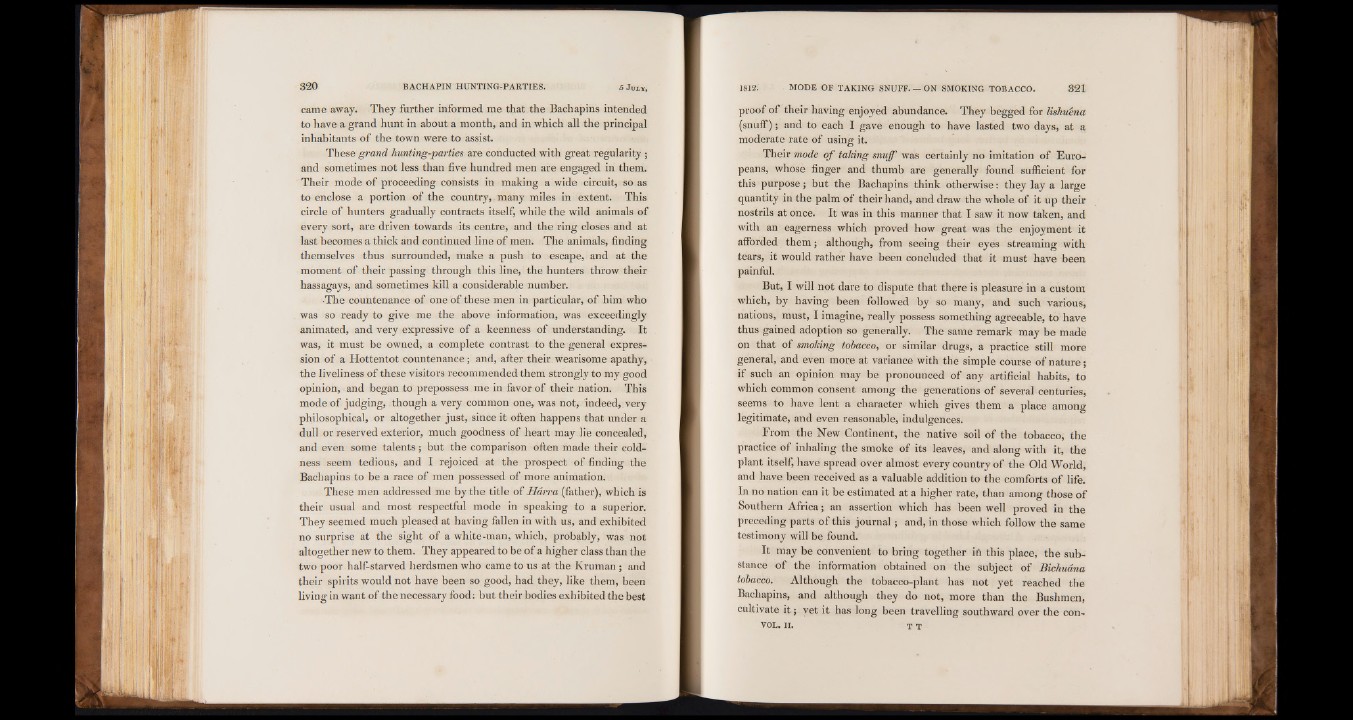
came away. They further informed me that the Bachapins intended
to have a grand hunt in about a month, and in which all the principal
inhabitants of the town were to assist.
These grand hunting-parties are conducted with great regularity ;
and sometimes not less than five hundred men are engaged in them.
Their mode of proceeding consists in making a wide circuit, so as
to enclose a portion of the country, many miles in extent. This
circle of hunters gradually contracts itself, while the wild animals of
every sort, are driven towards its centre, and the ring closes and at
last becomes a thick and continued line of men. The animals, finding
themselves thus surrounded, make a push to escape, and at the
moment of their passing through this line, the hunters throw their
hassagays, and sometimes kill a considerable number.
■The countenance of one of these men in particular, of him who
was so ready to give me the above information, was exceedingly
animated, and very expressive of a keenness of understanding. It
was, it must be owned, a complete contrast to the general expression
of a Hottentot countenance; and, after their wearisome apathy,
the liveliness of these visitors recommended them strongly to my good
opinion, and began to prepossess me in favor of their nation. This
mode of judging, though a very common one, was not, indeed, very
philosophical, or altogether just, since it often happens that under a
dull or reserved exterior, much goodness of heart may lie concealed,
and even some talents; but the comparison often made their coldness
seem tedious, and I rejoiced at the prospect of finding the
Bachapins to be a race of men possessed of more animation.
These men addressed me by the title of Harra (father), which is
their usual and most respectful mode in speaking to a superior.
They seemed much pleased at having fallen in with us, and exhibited
no surprise at the sight of a white-man, which, probably, was not
altogether new to them. They appeared to be of a higher class than the
two poor half-starved herdsmen who came to us at the Kruman; and
their spirits would not have been so good, had they, like them, been
living in want of the necessary food: but their bodies exhibited the best
proof of their having enjoyed abundance. They begged for lishuena
(snuff); and to each I gave enough to have lasted two days, at a
moderate rate of using it.
Their mode of taking snuff was certainly no imitation of Europeans,
whose finger and thumb are generally found sufficient for
this purpose; but the Bachapins think otherwise: they lay a large
quantity in the palm of their hand, and draw the whole of it up their
nostrils at once. It was in this manner that I saw it now taken, and
with an eagerness which proved how great was the enjoyment it
afforded them; although, from seeing their eyes streaming with
tears, it would rather have been concluded that it must have been
painful.
But, I will not dare to dispute that there is pleasure in a custom
which, by having been followed by so many, and such various,
nations, must, I imagine, really possess something agreeable, to have
thus gained adoption so generally. The same remark may be made
on that of smoking tobacco, or similar drugs, a practice still more
general, and even more at variance with the simple course of nature;
if such an opinion may be pronounced of any artificial habits, to
which common consent among the generations of several centuries,
seems to have lent a character which gives them a place among
legitimate, and even reasonable, indulgences.
From the New Continent, the native soil of the tobacco, the
practice of inhaling the smoke of its leaves, and along with it, the
plant itself, have spread over almost every country of the Old World,
and have been received as a valuable addition to the comforts of life.
In no nation can it be estimated at a higher rate, than among those of
Southern Africa; an assertion which has been well proved in the
preceding parts of this journal; and, in those which follow the same
testimony will be found.
It may he convenient to bring together in this place, the substance
of the information obtained on the subject of Bichuana
tobacco. Although the tobacco-plant has not yet reached the
Bachapins, and although they do not, more than the Bushmen,
cultivate it ; vet it has long been travelling southward over the con-
VOL. II. x T